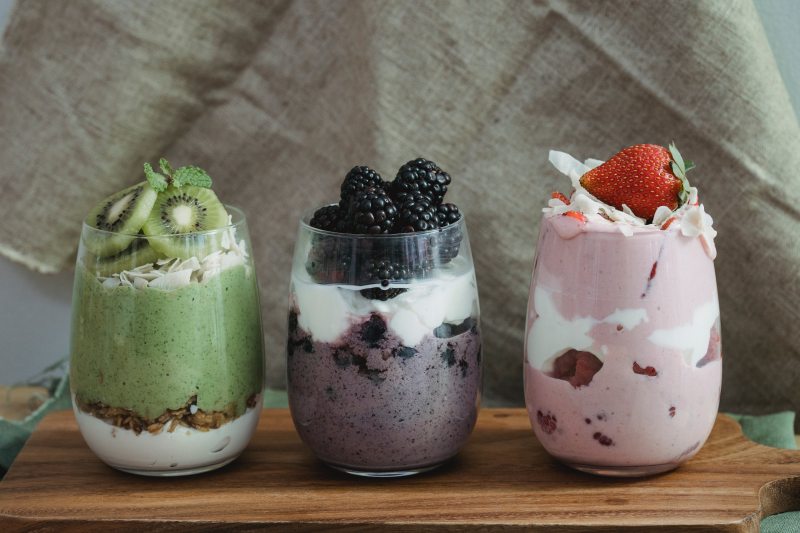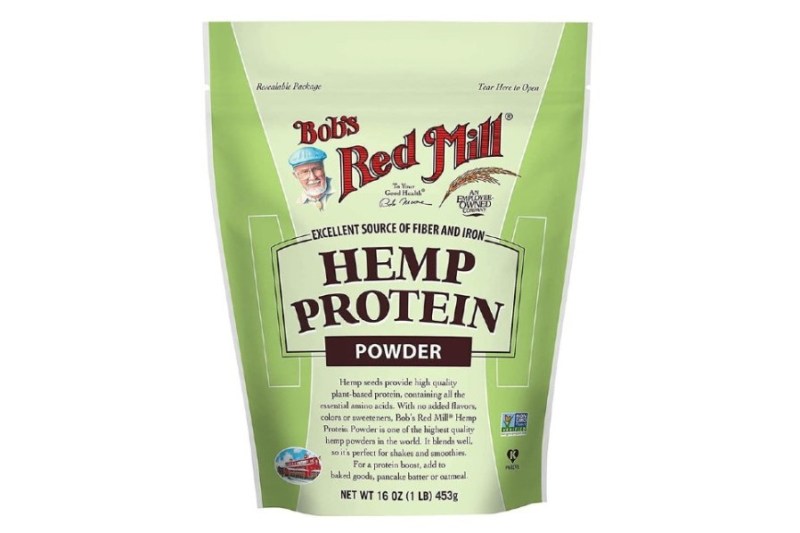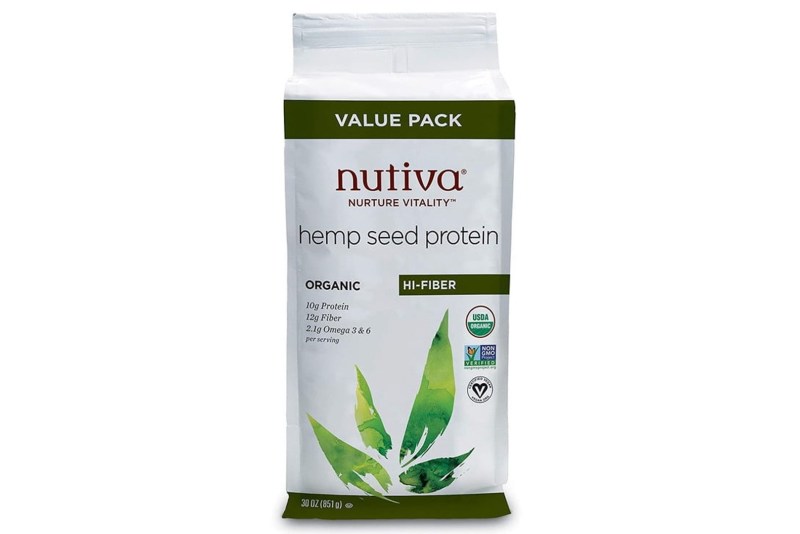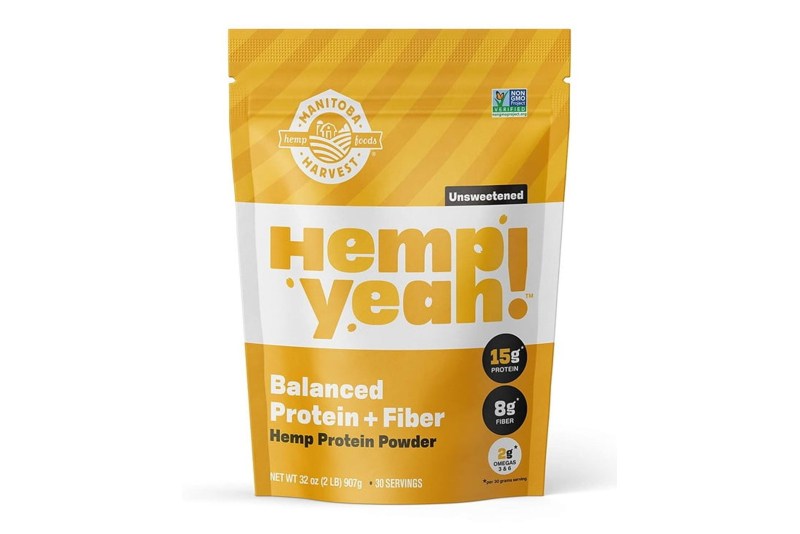
Whether you mix them with plain water or your favorite milk or milk substitute or blend them together in a nutritious protein shake or smoothie with fruits, vegetables, nut butter, and other superfoods, protein powders offer a versatile way to quick, on-the-go nutrition, particularly if you do not have time to eat or prepare food. Protein powders also offer a convenient way to refuel your muscles and body after a workout when the thought of drinking the nutrients you need for recovery is more palatable than eating solid food.
There are quite a few types of protein powders available, ranging from whey, egg, and casein proteins, to vegan options like pea, soy, or rice protein. Each protein source offers a different amino acid profile, so oftentimes, protein powders incorporate several sources of protein to provide an ample concentration of all nine essential amino acids.
Although it wasn’t that many years ago that hemp protein powder could only be found in niche vegan markets, it is now a widely available and popular plant-based protein supplement. Unlike many plant-based protein sources, hemp protein contains all nine essential amino acids and is, therefore, a complete source of protein and a great option for vegans or those with poor tolerance to whey. If you are looking for ways to conveniently boost your protein intake and fuel your body with the nutrients it needs to rebuild and repair after workouts or to conquer your everyday life with vitality, keep reading to learn about the health benefits of hemp protein and how to incorporate hemp protein into your diet.
What Is Hemp Protein?
Hemp protein powder is made by grinding the seeds of the hemp plant. It does not contain any marijuana, THC, or psychoactive compounds. It has an earthy taste with nutty undertones. Depending on the powdered formulation, the hemp seed powder may be defatted to isolate the protein in a concentrated form, or kept in a more whole form with the essential fatty acids intact. Since the latter is more common, most hemp protein powders have a higher fat content than other common protein powders, though the fats in hemp are heart-healthy, anti-inflammatory fatty acids.
Hemp protein powder contains all 20 amino acids, including the nine essential amino acids—the ones that must be consumed because the body cannot produce them endogenously. It also contains significantly more fiber than most protein powders, along with vitamins and minerals.
Benefits of Hemp Protein

In addition to the standard benefits of any protein powder—such as convenience and versatility—hemp protein powder has some unique benefits.
- Complete source of plant-based protein: With all nine essential amino acids, hemp protein is a complete source of protein, which is uncommon for plant-based sources. For those with sensitivities to soy, egg, whey, or casein (other complete proteins), consuming hemp protein over something like rice can ensure you’re getting all of the amino acids you need to rebuild and repair muscles.
- Good source of healthy fats: Hemp protein provides a different nutritional profile than most protein powders and tends to be less processed. About 10% of the average dry weight of hemp protein powders comes from unsaturated fats, including omega-3 fatty acids.
- Contains vitamins and minerals. Hemp seeds are a rich source of key minerals, including calcium, magnesium, phosphorus, iron, zinc, and copper.
- Supports digestion. Ground hemp seeds are an excellent source of soluble and insoluble fiber, increasing feelings of satiety and aiding digestion and bowel regularity.
- Hypoallergenic and anti-inflammatory. Hemp protein ranks among the lowest in terms of the prevalence of sensitivities, making it a good option for those with poor tolerance to egg, soy, whey, etc. Due to the omega-3 fatty acids and the gamma-linoleic acid (GLA) content, hemp seeds reduce inflammation in the body and have been shown to alleviate pain associated with arthritis.
- Improves circulation. Hemp contains a high concentration of arginine, an amino acid involved in the production of nitric oxide, which in turn dilates blood vessels. As such, hemp may help lower blood pressure.
- Nourishes skin. Hemp protein powder provides vitamin E, an antioxidant that improves the integrity of cell membranes and nourishes hair and skin cells.
Drawbacks of Hemp Protein
Though hemp protein has quite a few benefits, it’s not necessarily the best protein source for everyone. As it contains more fiber than most protein powders, hemp protein powder may cause gastrointestinal distress and diarrhea in high quantities or in those with sensitive guts. It also tends to be grittier and have a more pronounced earthy flavor than egg, rice, or whey protein, such that hemp protein doesn’t mix as well into plain water and flavored hemp proteins often still have a grassy note. Lastly, in terms of protein density, hemp protein usually contains less protein per calorie than egg or whey because of the fatty acid and fiber content. That said, it is a more complete food and less refined that protein isolates.
How to Use Hemp Protein Powder

Hemp protein powder can be mixed into water, juices, or milk/milk alternatives, or blended into smoothies and protein shakes. It also can be added to oatmeal, yogurt, or other hot cereal. Hemp protein lower can also be used in pancake or bread batters, cakes, homemade protein balls, granola bars, or brownies. You can substitute up to 1/4 of the flour in any recipe with hemp
Best Hemp Protein Powders
When buying hemp protein powder, look for ones that have few ingredients, and primarily contain cold-pressed hemp seeds. Added sugars and artificial sweeteners should be avoided.
Bob’s Red Mill Resealable Hemp Protein Powder

This single-ingredient hemp protein powder provides 12 grams of protein and 11 grams of fiber in each 1/4 cup. As it is unflavored, it can be used in baked goods and batters as well as drinks.
Nutiva USDA Organic Cold-Pressed Raw Hemp Seed Plant Protein

You can’t get much cleaner and “real food” than this Nutiva USDA Organic Cold-Pressed Raw Hemp Seed Plant Protein. This high-fiber, organic hemp protein powder is made by gently pressing raw hemp seeds without using hexane, preservatives, additives, or added sugar.
Manitoba Harvest Hemp Yeah! Balanced Protein + Fiber Powder Unsweetened

Each serving of Manitoba Harvest Hemp Yeah! Balanced Protein + Fiber Powder provides 15 grams of protein, 8 grams of fiber, 2 grams of healthy fats, and 110 calories, along with many minerals. It’s unsweetened, organic, and easier to mix smoothly into liquids than many hemp powders.



